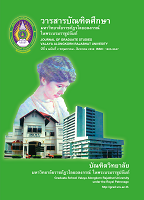ปัจจัยที่ส่งผลต่อความสำเร็จของการจัดฝึกอบรมด้านช่างให้กับบุคลากร ขององค์กรปกครองส่วนท้องถิ่นของกรมทางหลวงชนบท : กรณีศึกษาพื้นที่ สำนักทางหลวงชนบทที่ 1 (ปทุมธานี) FACTORS AFFECTING THE SUCCESS OF THE TECHNICAL TRAINING TO PERSONNEL OF THE LOCAL GOVERNMENTS
Main Article Content
Abstract
บทคัดย่อ
การศึกษาครั้งนี้มีวัตถุประสงค์เพื่อ 1) ศึกษาระดับความสำเร็จของการจัดฝึกอบรมด้านช่างให้กับบุคลากรขององค์กรปกครองส่วนท้องถิ่น 2) ศึกษาความแตกต่างของความสำเร็จของการจัดฝึกอบรมด้านช่างให้กับบุคลากรขององค์กรปกครองส่วนท้องถิ่นแต่ละประเภท 3) ศึกษาปัจจัยที่ส่งผลต่อความสำเร็จของการจัดฝึกอบรมด้านช่างให้กับบุคลากรขององค์กรปกครองส่วนท้องถิ่น 4) เสนอแนะกลยุทธ์การพัฒนาการจัดฝึกอบรมด้านช่างให้กับบุคลากรขององค์กรปกครองส่วนท้องถิ่น
รูปแบบการวิจัยใช้รูปแบบการวิจัยแบบไม่ทดลอง เป็นการวิจัยเชิงสำรวจ เน้นการวิจัยเชิงปริมาณ และการวิจัยเชิงคุณภาพ ประชากรที่ศึกษาคือบุคลากรขององค์กรปกครองส่วนท้องถิ่นที่ผ่านการฝึกอบรมด้านช่าง ที่จัดโดยกรมทางหลวงชนบท จำนวนทั้งสิ้น 392 คน จากพื้นที่สำนักทางหลวงชนบทที่ 1 (ปทุมธานี) ประกอบด้วย 5 จังหวัด คือ ปทุมธานี นนทบุรี สมุทรปราการ พระนครศรีอยุธยา และอ่างทอง เครื่องมือที่ใช้ในการวิจัยคือ แบบสอบถามและแบบสัมภาษณ์ และวิเคราะห์ข้อมูลโดยใช้ค่าสถิติ ได้แก่ การแจกแจงความถี่ ค่าร้อยละ ค่าเฉลี่ยเลขคณิต ค่าส่วนเบี่ยงเบนมาตรฐาน และการวิเคราะห์ถดถอยเชิงพหุโดยวิธีขั้นตอน ส่วนการวิเคราะห์ข้อมูลเชิงคุณภาพใช้การวิเคราะห์ SWOT
ผลการวิจัย พบว่า
1. ระดับความสำเร็จของการจัดฝึกอบรมด้านช่างให้กับบุคลากรขององค์กรปกครองส่วนท้องถิ่น ของกรมทางหลวงชนบท มากกว่าร้อยละ 80
2. องค์กรปกครองส่วนท้องถิ่น ได้แก่ องค์การบริหารส่วนตำบล (อบต.) มีความต้องการในการพัฒนาบุคลากรด้านช่างแตกต่างจากเทศบาล และองค์การบริหารส่วนจังหวัด (อบจ.)
3. สมรรถนะ และตัวแปร 3 วงกลม เป็นปัจจัยที่ส่งผลต่อความสำเร็จของการจัดการฝึกอบรมด้านช่างให้กับบุคลากรขององค์กรปกครองส่วนท้องถิ่น
4. กลยุทธ์ที่ควรนำมาใช้ในการพัฒนาการจัดฝึกอบรมด้านช่างให้กับบุคลากรขององค์กรปกครองส่วนท้องถิ่น คือ ควรปรับปรุงข้อมูลให้เป็นปัจจุบัน ปรับปรุงเนื้อหาให้ตรงกับความต้องการ จัดทำสื่อออกเผยแพร่แบบออนไลน์ ส่งวิทยากรไปแนะนำในพื้นที่ ปรับเปลี่ยนรูปแบบวิธีการฝึกอบรม สร้างเครือข่าย และช่องทางในการติดต่อกับช่างโดยตรง และจัดตั้งหน่วยบริการเคลื่อนที่
ABSTRACT
The purposes of this study are 1) study the level of success of training on mechanics for personnel from local administrative organization, 2) study the differences in success of training on mechanics for personnel in each type of local administrative organization, 3) study the factors influencing success of training on mechanics for personnel of local administrative organization and 4) to recommend the strategies for development of training on mechanics for personnel of local administrative organization.
The research design is non-experimental design and survey based research focusing on the quantitative research, as well as the qualitative research. The population for this study are 392 personnels of local administrative organization having passed training on mechanics organized by the Department of Rural Roads (DRR), in the area of Bureau of Rural Roads 1 (Pathumthani) covering 5 provinces; Pathumthani, Nonthaburi, Samut Prakan, Phranakhon Si Ayutthaya and Ang Thong, The Instruments used for this research are base on the questionnaire and the interview. Data are analyzed by applying frequency distribution, percentage, mean, standard deviation and stepwise multiple regression analysis while qualitative data analysis applied SWOT analysis.
The findings were as follows
1. Level of success of training on mechanics for personnel of local administrative organization by the Department of Rural Roads was more than 80%
2. Tambon administrative organization’s requirement for the development of mechanical personnel differs from that of municipality and Provincial Administration Organization.
3. Both variables competency and 3 circles had influenced the success of training on mechanics for personnel of local administrative organization
4. Strategies required for improving training on mechanics for personnel of local administrative organization are to update data and adapt the content to fit the need of the attendants, to publicize on online media, to send lecturer for orientation in the area, to modify training pattern, and to develop network and channel for direct contact with the mechanic and set up mobile unit.
Article Details

This work is licensed under a Creative Commons Attribution-NonCommercial-NoDerivatives 4.0 International License.
บทความทุกเรื่องได้รับการตรวจความถูกต้องทางวิชาการโดยผู้ทรงคุณวุฒิ ทรรศนะและข้อคิดเห็นในบทความ Journal of Global of Perspectives in Humanities and Social Sciences (J-GPHSS) มิใช่เป็นทรรศนะและความคิดของผู้จัดทำจึงมิใช่ความรับผิดชอบของบัณฑิตวิทยาลัย มหาวิทยาลัยราชภัฏวไลยอลงกรณ์ ในพระบรมราชูปถัมภ์ กองบรรณาธิการไม่สงวนสิทธิ์การคัดลอก แต่ให้อ้างอิงแหล่งที่มา


